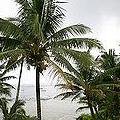 全球海水溫化,太平洋諸島國首當其衝;聯合國與美屬薩摩亞(Samoa)鍳此計劃成立一跨機構氣候變遷專門中心,協助整合所有對此區域的援助工作。19日於紐埃(Niue)首都阿洛非(Alofi)召開的「太平洋群島論壇高峰會」中,聯合國秘書長潘基文透過一份聲明指出,太平洋島國在氣候變遷的直接衝擊下形同風中殘燭,於是此新機構的成立將首重解決諸島國所面臨的人口遷移、調適與化解災害風險等問題。
全球海水溫化,太平洋諸島國首當其衝;聯合國與美屬薩摩亞(Samoa)鍳此計劃成立一跨機構氣候變遷專門中心,協助整合所有對此區域的援助工作。19日於紐埃(Niue)首都阿洛非(Alofi)召開的「太平洋群島論壇高峰會」中,聯合國秘書長潘基文透過一份聲明指出,太平洋島國在氣候變遷的直接衝擊下形同風中殘燭,於是此新機構的成立將首重解決諸島國所面臨的人口遷移、調適與化解災害風險等問題。
潘基文並表示,「在氣候變遷的議題上聽見太平洋島國的聲音,本人心感鼓舞。」「氣候變遷絕非電影片段場景,而是如貴國們所深刻體認到的立即與真實」。「氣候變遷」是2008年高峰會探究的主要議題,因為全球暖化的效應再再威脅到糧食安全與島國族群的存滅。聯合國轄下數個機構已與太平洋群島論壇展開合作,從農漁業發展至都市化等皆是參與之議題。
聯合國糧農組織的報告預測,地球溫度持續升高導致惡果,未來對依賴捕撈為生的數億人口造成威脅,而太平洋諸島國正身列其中。報告亦顯示,海水溫度的變化會改變水生生物體內溫度。水溫升高不但不利生物的新陳代謝、生長率、繁殖,以及魚類與貝類對於疾病與毒質的敏感性,對於生物的棲地更是帶來負面的影響。
報告指出,海水溫度升高使得過去常見的溫水物種,逐漸向南北極兩帶集中。另外在熱帶地區,接近海平面的含鹽度增加;而寒帶地區則因大量降雨與融冰的緣故,海水含鹽度相對較低。此外,海洋海水的酸化,將會破壞珊瑚礁與可以形成鈣殼的有機體的生長環境。
糧農組織預測,地處高緯度的漁村以及高度依賴珊瑚礁生態的太平洋群島,將是氣候變遷下最直接的受害者。另一方面,位於沙洲、珊瑚環礁與冰凍海岸等地的漁獲,則將因海平面上升而遭受洪水與海岸侵蝕的波擊。聯合國指出,全球約有4,200萬人口從事與漁業相關之工作,而此部門產業之龐大,足以提供全球計約數億份工作機會,包括海產加工、供應、銷售與經銷等,其中大多數從業人口來自於發展中國家。
水產食物擁有高營養價值,供應全球超過28億人口所攝取20%以上的平均動物性蛋白;同樣地,大多數是來自發展中國家。聯合國表示,漁獲是世界市場上交易量最大的食物,也是許多貧窮國家掙得收入的主要出口資源。因此,太平洋群島國家格外正視此些議題。
The United Nations and Samoa plan to establish an Inter-Agency Climate Change Centre to help coordinate support to Pacific Island countries to combat the impact of global warming in their region. Given the direct impact of climate change on vulnerable countries in the region, the new agency will focus its support on the mitigation, adaptation and reduction of the risk of disaster facing the Islands, Secretary General Ban Ki-moon said today in a message to the Pacific Islands Forum Summit meeting, held in Alofi, Niue.
"I am very heartened that the Pacific island countries are making their voices heard on the subject of climate change," Ban said. "Climate change is not science fiction. As your countries know all too well, it is real and present." The main theme of this year's summit is climate change, as the effect of global warming is a threat to food security and safety of island communities. Several UN agencies already collaborate with the Pacific Islands Forum, assisting on issues from farming and fisheries to urbanization.
The report by the UN Food and Agriculture Organization predicts that Earth's rising temperature will have serious consequences for the hundreds of millions of people who depend on fishing for their livelihoods, as many people do in the Pacific Island countries. It documents how changes in sea temperatures alter the body temperature of aquatic species. Warmer waters adversely impact the metabolism, growth rate, reproduction and susceptibility to diseases and toxins of these fish and shell fish.
Warmer water species are now increasing toward the South and North Poles, the report states. There also has been an increase in salinity in near-surface waters in hotter regions. The opposite is occurring in colder areas because of greater precipitation and melting ice. In addition, the oceans are becoming more acidic with negative consequences for coral reefs and organisms that form calcium shells.
Fishing communities in the world's high-latitudes, as well as those that rely on coral reef systems such as the Pacific Islands, will be most exposed to the impact of climate change, the FAO predicts. Fisheries located in deltas, coral atolls and ice-dominated coasts will be vulnerable to flooding and coastal erosion because of rises in sea level.
The UN says about 42 million people work directly in the fishing sector, most of them in developing countries. Adding those who work in fish processing, supply, marketing and distribution, the fishing industry supports several hundred million jobs worldwide.
Aquatic foods have high nutritional quality, contributing 20 percent or more of average per capita animal protein intake for more than 2.8 billion people, again mostly in developing countries. Fish is also the world's most widely traded food, the UN says, and is a key source of export earnings for many poorer countries. These issues have particular significance for Pacific small island States.
全文及圖片詳見:ENS




